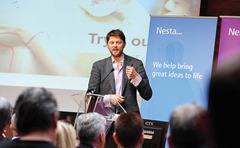Social solutions from technology
 Glen Mehn, Managing Director of Social Innovation Camp, talks to Peter Cheney about how its approach helps to find solutions to social problems.
Glen Mehn, Managing Director of Social Innovation Camp, talks to Peter Cheney about how its approach helps to find solutions to social problems.
“What can you do with technology to make the world that you live in better?” is the key question that Social Innovation Camp asks its clients, according to its Managing Director Glen Mehn.
The company is based in London and was set up four years ago. It runs events where software developers and people with an understanding of a particular social problem meet up and start to look at how technology can help to bring about solutions.
Mehn studied English literature and sociology at the University of New Orleans, his home city, and holds an MBA from Oxford. He has been working in IT and business start-ups for 15 years.
People are encouraged to define their problems succinctly and identify the cause and effect e.g. “They’re teaching my child maths in a different way so I can’t help my child with homework.”
The setting is informal and “fun, engaging processes” help people to think outside the box and work out how to put their ideas into practice. Groups of people then “brainstorm” solutions under time pressure, anything from one hour to 48 hours.
“Particularly with technology,” he remarks, “the interesting thing is that in 20 years (more or less) of us having the internet, it’s gone from being a real niche area where you needed very specialised skills to, now, you get yourself up with a twitter account, a facebook account and a website.”
Mehn adds: “We want to show people how easy it is to build a new solution that can really address a social issue.”
agendaNi is speaking to him at NESTA’s innovation roadshow at Queen’s University Belfast. Mehn has just completed a trip around Northern Ireland, running five initial workshops about his organisation’s work.
“Once you get people to articulate the problems [and] the challenges that they have, it works really well,” he comments. “I think people then getting really excited about the possibilities.”
Camps have been run in 24 countries. It’s not a matter of coming in with answers but instead showing people a set of tools and letting them go and use them. “It constantly gives me hope for the future, no matter where we go, that this kind of process works really well,” Mehn comments.
On its own website (sicamp.org), Social Innovation Camp states that the “old way of doing things doesn’t work any more”. It says that top-down models of business and service delivery are “inefficient and ineffective, failing to meet the increasingly complex demands of modern society.”
That traditional approach will “increasingly become meaningless” to societies, communities and individuals if technology is not involved.
Pressed on this, Mehn accepts that a variety of approaches are needed to deliver social change but points out one case where the failure of a large project has resulted in considerable waste. The £12 billion English NHS National Programme for IT was cancelled in 2011 after six years of work.
The better alternative, he says, is to get “lots of small companies to solve all those individual problems” and have a policy framework in place which ensures that they talk to each other and share their solutions.
Case studies
Enabled by Design: A community of people passionate about well-designed everyday products for people with physical disabilities. Matches up people who use assistive equipment with designers who can make it better.
www.enabledbydesign.org
MyPolice: An online feedback system for the police service, allowing direct, open conversations between the public and the police.
www.mypolice.org
FLIP: Matches young people with employment opportunities by helping them to use social networks to write a CV.
www.flipyourself.co.uk





